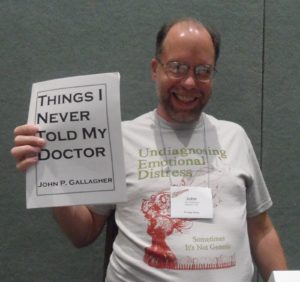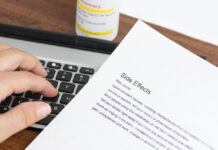I have had quite a few discussions with people who have not heard of the research on this site. Very often as soon as I start pointing out the problems with medications, people assume that I am completely against any use of medications. Well, I’m not. I’m for careful, judicious, cautious use of medications. I’m just against the current paradigm of medications first, for everyone, and forever.
I had a disucssion with some of my other Whitaker-informed advocate friends to figure out our real position. This is in our UnDiagnosing Emotional Distress online discussion group which we’d love you to join. My friends gave me permission to summarize that discussion on our http://WellnessWordworks.com blog. Mostly we are for temporary and fully informed and very cautious medication use. My blog also has a video by Robert Whitaker that I can’t seem to embed into this site.
http://wellnesswordworks.com/anti-medication-critics/
Mostly we think that if people want to take medications after:
1) knowing the true outcomes research (antidepressants effective as placebo)
2)knowing the risks and dangers of side effects (like the 18 fold risk of heart attack combining SSRI’s and antispychotics)
3) knowing the withdrawal effects that can be severe (up to a year for some people for SSRI’s)
4) knowing that the medication may predispose people to further illness (25% depression relapse for placebo, 42% for meds)
Then it should be their choice. People who do not know these things before taking medications do not have a real choice. Many medication critics still take at least some medications knowing all of the above and find it helpful in some temporary situations.
However, in our social messaging, it can be hard to get past first impressions. It’s hard not scare some people away. One really important idea is a quote from my favorite former boss, Randy Johnson, “Some ways of being honest are more productive than others, but still carry the same truth.” It’s really a balancing act to find words that can reach the most people

Language is very important. I have talked to many people that want me to use more radical language and many people that are scared of the way I talk. I have a T-shirt that says, “Sometimes it’s not genetic.” Then it lists the other things it could be, like trauma or a poor job fit or ineffective exercise or nutrition or spiritual crises or family friction. The T-shirt sold out at Alternatives, but some more radical activists tell me, “Well, you shouldn’t say ‘sometimes’. It’s never genetic.”
Well, for one thing, I didn’t want to scare off people, but I haven’t dumbed down or made my message inaccurate. As a biologist, pretty much everything is genetic, like breathing, blood clotting, metabolism, speech, etc, things that we hopefully all do. So it’s accurate to say “sometimes it’s not genetic.” Just like some natural medicine people look for chemical-free products, but according to the definitions of chemistry, anything made of molecules, including water, is a chemical.
The key is not to totally freak out people who are still stuck in the system while still being honest and accurate. Like saying, “People do better on as few medications as possible,” says almost the same thing as “People do better on no medications,” but it freaks out a lot less people. Like “medication reduction,” freaks out less people but the process is exactly the same as “medication withdrawal.” If we can help someone get from 6 meds to 1, the 1 to zero is a lot easier.















I have to disagree with your examples at the end. People doing better on as few “medications” as “possible” is not the same as the fact that people do better off of them. Most people will assume that they need some amount of drugs and their doctor will agree. So “as few as possible” will still wind up being 2 or 3 drugs for most people, at moderate to high dosages, with no thought of ever trying NONE.
Second, medication reduction is not the same as tapering or withdrawal. A doctor doing medication reduction will simply lower the dose from a high or obscenely high dose to a moderate or mild dose, with no intention of ever stopping it. Again, world of difference.
Report comment
Pretty much everything is genetic, yes. But the question remains whether genes are the be-all and end-all, the cause, or whether they, too, represent just a “symptom”. So, if you mention genes in the same breath with trauma and other environmental factors the way you do, you actually omit the fact that environmental factors are what influences genes. And omitting this fact is what allows those who want all behavior to be caused by genes to have it their way. Because, if it is genetic, if only sometimes, who can say when it is genetic, and when it is not? In practice, you will once again get the result that some, less disturbing, and more socially accepted behavior may be attributed to environmental factors, while more disturbing, and less socially accepted behaviors inevitably will be attributed to a genetic predisposition, and you’re back at square one.
The truth will always put certain people off, and if you want to please everyone, you will have to compromise it. I think it is more a question of how you present the truth, than of which part of it you present, and which one you choose to keep silent about in order to avoid putting certain people off.
Report comment
Here’s my blog about the genetic cascade that happens when emotional distress causes psychosis. I think we’re on the same page about research, the question is really communication. I’ve always heard it’s a good practice to never says, “always or never.” 🙂 http://wellnesswordworks.com/emotional-distress-causes-psychosis/
Report comment
Regarding “How do we alienate as few people as possible?”
In a conflict, you have to have at least two opponents.
The Psychiatrist says the patient is ill . The law gives psychiatry the power to judge people “ill”.
In objective reality there is nothing physically wrong with the patient. Medications are to manipulate the one deemed “ill”.
The only person you can help is yourself.
Eurythmics Song “Sweet Dreams”
Sweet dreams are made of this
Who am I to disagree?
I travel the world and the seven seas
Everybody’s looking for something
Some of them want to use you
Some of them want to get used by you
Some of them want to abuse you
Some of them want to be abused
With my addition
Some of them want to own you
Some of them want to be owned
Report comment
It turns out that the only person I have to worry about alienating is the old guy I look at in the mirror every morning.(-:
Report comment
When I was a peer worker I was concerned about alienating peers who were taking medications. Now that I no longer have that role I am free to talk about my own life-threatrening experience with drugs to fix trauma and I don’t have to apologize. I was sick to death on the drugs and I am vibrant and functional off them that’s all the evidence I need to offer. It’s never been easy to talk people out of their coping mechanisms; if you think a treatment is helping no scientific evidence will sway you.
Report comment
Corinna, I always appreciate your perspective and your energy!
I have spent my academic and professional career looking at the power of words to create meaning, bridges or walls, openings for growth or doors that slam shut.
I would like to thank you for drawing our attention to how we can create healing dialogues that can support recovery and change attitudes and actions.
I have seen more lectures than dialogues when the truth is “told.” I have seen more healing, personal empowerment and acceptance when truths are “shared” and understood as emerging from a process of lived experience and personal reflection leading to meaningful insights.
Vis a vis medications, I am finding the question mark as powerful as sharing the emerging science and “lived” evidence. When I acknowledge the ambiguity and difficult choices around medication decisions, I’m seeing more shifts in attitude, more openness to considering alternatives and exercising caution.
Looking forward to joining your discussion forum!
Report comment
If an adult decides to use drugs and they are actually informed as to the risks they take that is one thing. But what we are doing in drugging children is a crime. It was not unusual in the public school in which I worked to enroll 5 year olds already on a cocktail of 3-5 psychotropics, having been told that their brain is broken and that they must be on these medications for life. If this isn’t child abuse I don’t know what is!
Report comment
Dr. Crowder,
It is child abuse, without any question.
Thanks for being brave enough to point it out!
Duane
Report comment
What’s wrong with doing both?
Why can’t a person point out the risks (dangers) of psychiatric drugs (especially, antipsychotics long-term) while helping make people aware of options? Options that are much safer and far more effective?
I’m for presenting the facts.
And I think it can be done by presenting both the downside of drugs, and the hope and promise of recovery without drugs.
Duane
Report comment
Psychiatric misdiagnosis and consequent unnecessary or even destructive medication for “troubling” symptoms is an issue that impacts many gifted and talented people. Quotes by Gogo Lidz etc. “Gifted, talented and pathologized: Mood Disorders, Misdiagnosis and Medication” http://highability.org/54/mood-disorders-misdiagnosis-and-medication
Report comment